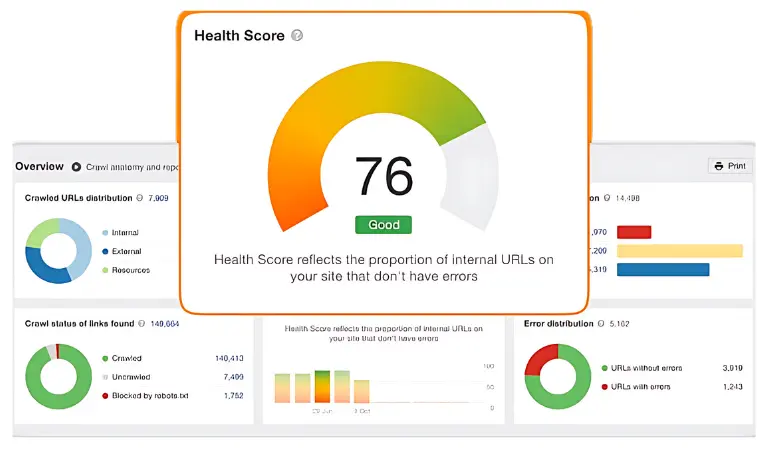Creating SEO reports is crucial for tracking and improving your SEO strategy and performance. Understanding SEO report basics will help you to gather and present crucial data. When creating SEO reports, it’s important to select the right SEO reporting tools that simplify data collection and analysis. Key SEO metrics to track include organic traffic, keyword rankings, and conversion rates. When these elements are focused, you can produce insightful reports to help make informed decisions and enhance your site’s visibility.
Why Do I Need SEO Reports?
If you are running an SEO campaign then you cannot ignore the importance of the SEO reports. They are crucial for understanding and improving your website’s performance. Creating the SEO reports means that you will be collecting the essential data regarding the website’s health and performance. The SEO audit report will compile data from different sources that will provide a thorough overview of your SEO efforts. With the help of systematically created SEO reports, you can identify strengths, weaknesses, and opportunities for improvement. With this planned strategy, you stay on top of trends and make informed decisions to improve your online presence.
-
Key SEO Metrics to Track
What are the key SEO metrics to track? Do you have any idea about them? If not then what is the point of Creating SEO reports? Knowing which metrics to monitor is crucial. Creating SEO reports isn’t just about SEO performance analysis but understanding the crucial SEO metrics as well. Some important SEO metrics to track include organic traffic, bounce rate, keyword rankings, and conversion rates. Tracking and monitoring these SEO metrics will help you understand how well your SEO campaign is performing along with your content performance, and how users are interacting with your site. Tracking these SEO metrics regularly can help you understand and learn the trends and patterns. This will help you to adjust your strategy for effective results.
-
Track SEO Progress And Campaign Performance
Regularly Creating SEO reports enables you to track the progress of your SEO strategies and SEO campaign. With this valuable information, you can adapt your strategies as required. Consistent SEO reporting may let you understand the latest trends and patterns and what is working for your SEO and what not. Understanding and fulfilling the SEO report checklist actively will keep you ahead of potential issues and you will be aware of the latest opportunities. Moreover, SEO reports provide clear, actionable knowledge that can be communicated to stakeholders. You can provide better information regarding your SEO efforts and further investment. By maintaining an SEO report structure and regular reporting schedule, it is easy to improve your website’s performance and achieve your long-term digital marketing goals.
Creating The SEO Report For Beginners
Now let’s talk about creating a simple yet effective SEO report as a beginner SEO professional.
-
Learning from SEO Report Examples

Understanding and analyzing the SEO report samples can provide important information regarding effective reporting practices. With the help of these examples, you can learn about how to organize your data, present your data clearly, and highlight key metrics. Also, you can learn about what your report lacks, best SEO practices, and how to implement them into your SEO campaign and adapt them to your reports. You can explain your results more effectively to stakeholders so they can make informed decisions.
-
Utilizing a Simple SEO Report Template
If you are new to SEO reporting then using a prebuilt SEO remote template can help you to start your SEO report. If you are looking for a good template then it should include, sections for traffic analysis, keyword performance, backlink quality, and technical SEO issues. With the help of a simple SEO report template, you can make sure that you will cover all important elements of your SEO efforts without getting overwhelmed. This approach is time-saving and ensures consistency in your reporting.
-
Structuring Your SEO Report
Presenting a well-structured SEO report will cover all of the key areas. A professional SEO report structure will typically include an executive summary, a detailed analysis of SEO metrics, insights and recommendations, and a thorough conclusion. Each section of your SEO report should be understandable and easy to read by the clients and other stakeholders. Visual elements such as charts and graphs can enhance the authenticity of the SEO report. They can make sure that the data is conveniently accessible. With the help of the structured approach to your SEO report, you will be assured that stakeholders can easily understand the key findings and take actionable steps so the website’s SERP ranking and performance will be improved.
-
Conducting an SEO Audit Report

An SEO audit audit report will thoroughly review your website’s SEO performance. This report analyzes any technical issues along with the content gaps, and backlink quality. With the help of tools like SEMrush, Moz, or Ahrefs, you can conduct a complete SEO audit to identify these issues. This process will help you find out where your SEO strategies are lacking so you will always perform the best SEO practices. With the help of regularly conducting SEO audits, you can maintain your site’s performance and enhance your SERP ranking.
Conclusion On Creating a Monthly SEO Report
It’s crucial to generate regular SEO reports to understand and improve your website’s performance. The SEO reports give you a good idea of how your site’s doing, its traffic, and how well it’s ranking for keywords. You’ll be able to make better decisions that way. By following these steps utilizing a pre-built template, to structure your report using the right tools, and planning your next steps-you can create effective SEO reports that highlight what’s working and what needs improvement. You can drive more organic traffic to your site by regularly monitoring and adjusting your SEO strategy.


